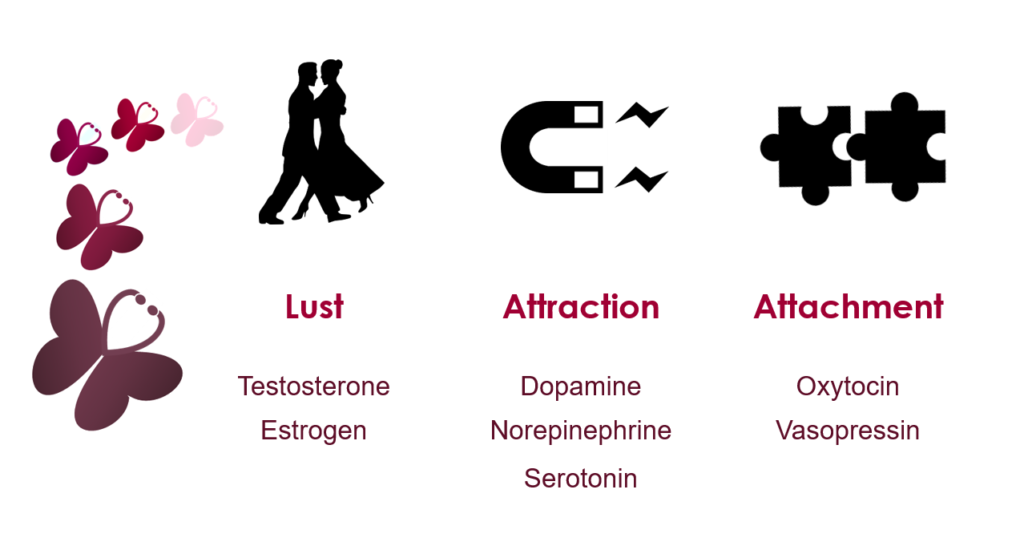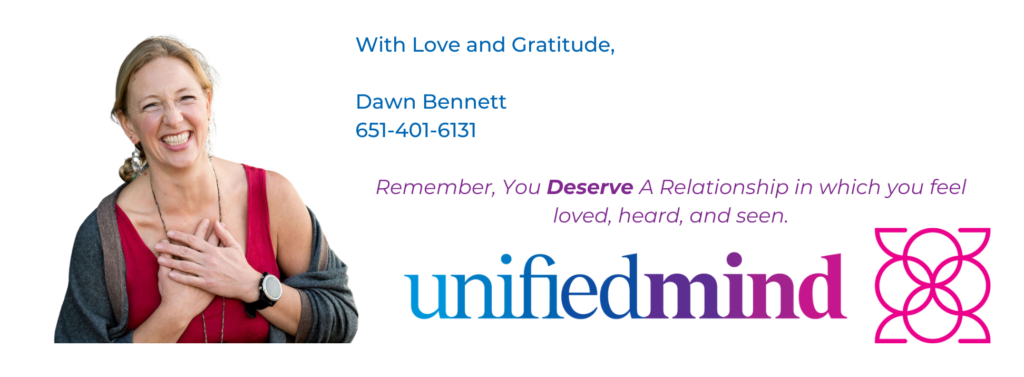Am I In Love? Or Is It Hormones?
Helen Fisher at Rutgers University writes in her research about the 3 stages of love.
- Lust
- Attraction
- Attachment
Each stage is driven by different biological hormones and neurotransmitters.

Lust and Sexual Desire
Lust is driven by sex hormones of testosterone and estrogen. You know, the Hollywood model of relationships? Love at first sight, hot sex, amazing connection until the hormones go away a couple years later and you think, “how did I get here?” Lust is amazing, is so much fun.
Yet when the hormones burn off, this is when we realize we’ve wasted another 6 months, year, or two with the wrong person. We may try to make it work, yet our core needs aren’t being met. So we nag the other to change, become turned off, or start getting our needs met elsewhere.
Attraction- It’s So Fun!

Attraction happens when you can think of nothing else. You become excited and hopeful— influenced by adrenaline, dopamine, and serotonin. Adrenaline activates your stress response in a way that feels positive. Perhaps you hold hands and your palms sweat, you get giddy receiving a text, and your mouth goes dry even thinking about them.
Then Dopamine stimulates your desire and reward centers. You know, the same hormone stimulated as you scroll on social media or have that glass of wine? You may feel an intense rush of pleasure, as if you are lovestruck. There can be increased energy with less need for sleep and food, your attention is focused, you delight in the smallest things they do.
Serotonin keeps the other on your mind all the time. Does Love change the way you think? OF COURSE!
Serotonin and OCD
There was an experiment conducted in Pisa, Italy measuring serotonin levels in couples in love for under 6 months and serotonin levels and they were the same levels seen in people with Obsessive Compulsive Disorder. Here is a summary of a similar study in the US here.
Duplicate Falling In Love
A York University researcher psychologist Dr. Aron studied why people fell in love and conducted an experiment about how to duplicate falling in love.
Apparently it is as easy as 3 steps… 1. Find a complete stranger 2. Reveal to each other intimate details about your lives for half an hour 3. Stare deeply into each other’s eyes without talking for 4 minutes.
With this recipe, when he asked volunteers to do that, many of the couples felt deeply attracted and connected and some of them even married. Isn’t it interesting how we ignore important compatibility traits with people when the body falls into chemical love?
So it’s interesting how we ignore important things about the other person when the body falls in chemical love…
Attachment and Long-Term Relationships
The attachment stage of hormonal release is when the long-term bonding can occur. And, when Chemistry is built on your partner’s Traits and Loving Consideration of you (meaning they treat you like a King or a Queen), your connection to your partner generally can maintain or increase.
According to this article in Frontiers in Ecology and Evolution, “In conjunction with oxytocin, vasopressin was critical to pair bond formation and selective sociality (Cho et al., 1999). Vasopressin also plays a major role in defensive behaviors such as mate guarding. Both males and females are affected by oxytocin and vasopressin.”
Understand Your Needs
This is why it is important to understand your needs for a long-term relationship. Your soulmate will have, as part of their behavioral being in the world, Traits that you need in order to thrive and be happy. How do you identify those traits for yourself and evaluate them in others? That’s why I offer the Learning to Find Love: Find Your Soulmate Course.
In A Relationship Now?
Compatible relationships can be saved when you are struggling. Some have run their course. It’s up to you to decide, but only after you have really evaluated the situation. That’s why the When to End It, When To Stay Course is so popular. You see, you can only win when you silence your mind and tune into your heart.
Looking For A Relationship Or A Change To A Current One?
Let’s chat. I’d love to help you find resources inside and outside yourself in any way I can.



